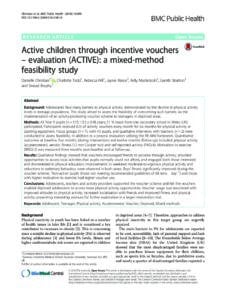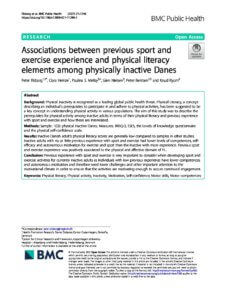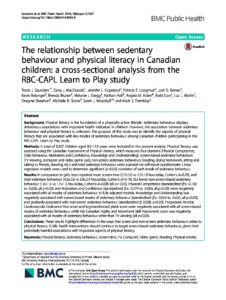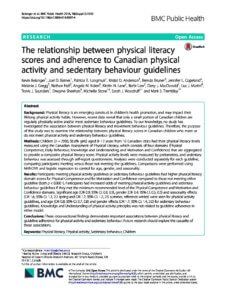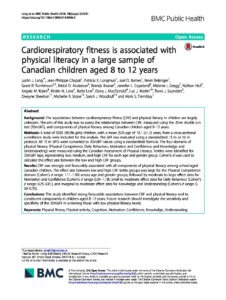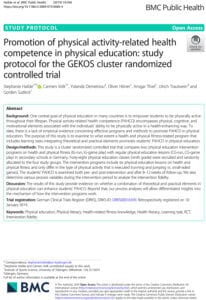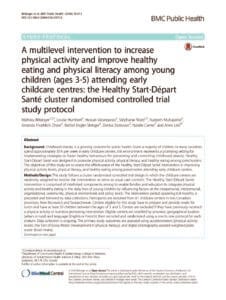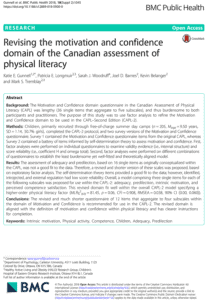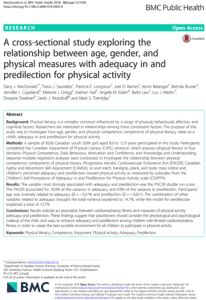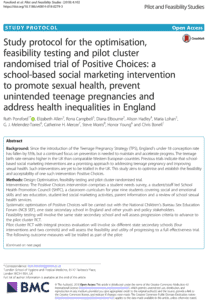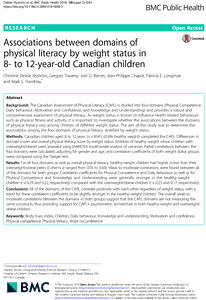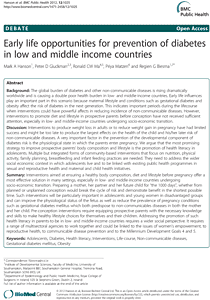-
Active children through incentive vouchers – evaluation (ACTIVE): a mixed-method feasibility study
Background Adolescents face many barriers to physical activity, demonstrated by the decline in physical activity levels in teenage populations. This study aimed to assess the… -
Associations between previous sport and exercise experience and physical literacy elements among physically inactive Danes
Background Physical inactivity is recognized as a leading global public health threat. Physical Literacy, a concept describing an individual’s prerequisites to participate in and adhere… -
The relationship between sedentary behaviour and physical literacy in Canadian children: a cross-sectional analysis from the RBC-CAPL Learn to Play study
Background Physical literacy is the foundation of a physically active lifestyle. Sedentary behaviour displays deleterious associations with important health indicators in children. However, the association… -
The relationship between physical literacy scores and adherence to Canadian physical activity and sedentary behaviour guidelines
Background Physical literacy is an emerging construct in children’s health promotion, and may impact their lifelong physical activity habits. However, recent data reveal that only… -
Cardiorespiratory fitness is associated with physical literacy in a large sample of Canadian children aged 8 to 12 years
Background The associations between cardiorespiratory fitness (CRF) and physical literacy in children are largely unknown. The aim of this study was to assess the relationships… -
Promotion of physical activity-related health competence (PAHCO) in physical education: study protocol for the GEKOS cluster randomized controlled trial
Background One central goal of physical education in many countries is to empower students to be physically active throughout their lifespan. Physical activity-related health competence… -
A multilevel intervention to increase physical activity and improve healthy eating and physical literacy among young children (ages 3-5) attending early childcare centres: the Healthy Start-Départ Santé cluster randomised controlled trial study protocol
Background Childhood obesity is a growing concern for public health. Given a majority of children in many countries spend approximately 30 h per week in… -
Revising the motivation and confidence domain of the Canadian assessment of physical literacy
Abstract Background The Motivation and Confidence domain questionnaire in the Canadian Assessment of Physical Literacy (CAPL) was lengthy (36 single items that aggregate to five… -
A cross-sectional study exploring the relationship between age, gender, and physical measures with adequacy in and predilection for physical activity
Background Physical literacy is a complex construct influenced by a range of physical, behavioural, affective, and cognitive factors. Researchers are interested in relationships among these… -
Study protocol for the optimisation, feasibility testing and pilot cluster randomised trial of Positive Choices: a school-based social marketing intervention to promote sexual health, prevent unintended teenage pregnancies and address health inequalities in England
Background Since the introduction of the Teenage Pregnancy Strategy (TPS), England’s under-18 conception rate has fallen by 55%, but a continued focus on prevention is… -
Associations between domains of physical literacy by weight status in 8- to 12-year-old Canadian children
Background The Canadian Assessment of Physical Literacy (CAPL) is divided into four domains (Physical Competence, Daily Behaviour, Motivation and Confidence, and Knowledge and Understanding) and… -
Early life opportunities for prevention of diabetes in low and middle income countries
Background The global burden of diabetes and other non-communicable diseases is rising dramatically worldwide and is causing a double poor health burden in low- and…


